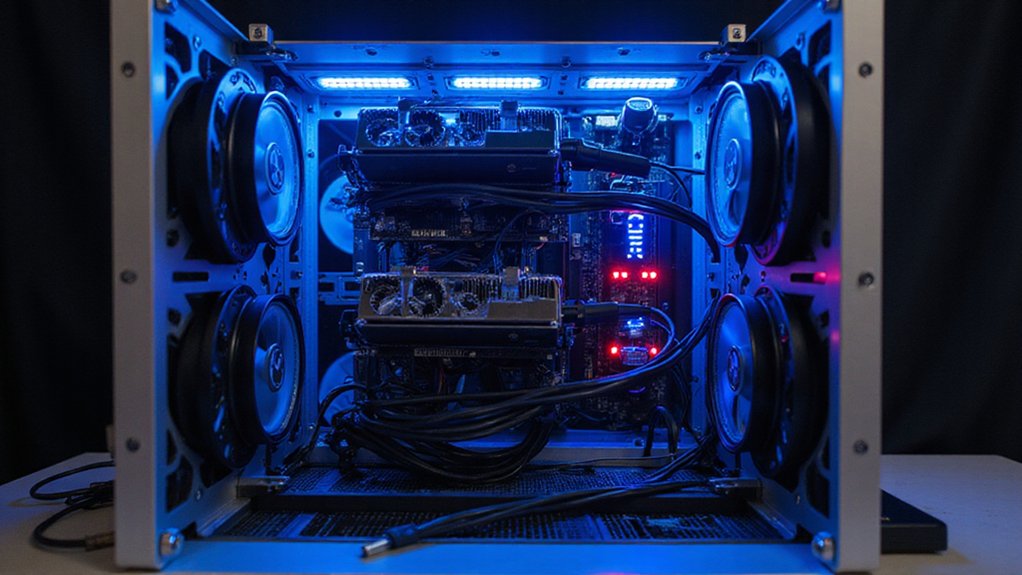Howard Lutnick, Cantor Fitzgerald’s chief, has emerged as Bitcoin’s institutional vanguard with unwavering conviction in its future. His aggressive accumulation strategy during market dips exemplifies his dollar-cost averaging approach on an impressive scale. Beyond acquisition, Lutnick secured a 5% stake in Tether valued at $600 million, despite regulatory scrutiny that ultimately impacted his cabinet-level aspirations. His philosophical stance positions Bitcoin as digital gold—a scarce, valuable asset demanding unrestricted global trade. The implications for American financial policy could be seismic.

Bitcoin evangelism has found few champions as influential as Howard Lutnick, whose unwavering conviction in cryptocurrency’s future has transformed from mere financial strategy into something resembling doctrinal certainty. The Cantor Fitzgerald chief has positioned himself as Bitcoin’s institutional vanguard, consistently distinguishing it from the cryptocurrency rabble he dismisses as “just not a thing” – a taxonomic exclusion that speaks volumes about his singular focus.
Lutnick’s Bitcoin fervor manifested concretely in Cantor’s $2 billion financing operation, designed to shepherd the digital asset into traditional finance’s hallowed halls. His acquisition of a 5% stake in Tether (valued at approximately $600 million) further cements his crypto credentials, though this relationship has attracted senatorial scrutiny regarding potential links to illicit financing – a prickly complication for someone ascending to cabinet-level authority. Senator Warren sent a detailed letter questioning his financial stake in Tether ahead of his confirmation hearing. Tether’s design as a stablecoin pegged to the US dollar helps reduce volatility in the crypto market while maintaining liquidity across various blockchain platforms.
Despite regulatory headwinds, Lutnick maintains that unclear governmental policies represent the primary obstacle to Bitcoin’s inevitable mainstream adoption. His public statements reveal not just advocacy but a personal commitment; he openly targets “Bitcoin billionaire” status through aggressive accumulation during market dips – a dollar-cost averaging strategy writ extraordinarily large.
His 2025 confirmation as Commerce Secretary necessitated resignation from Cantor Fitzgerald to satisfy ethics requirements, yet his pro-Bitcoin orientation remains intact. This unprecedented positioning of a crypto advocate at cabinet level portends potentially seismic shifts in American financial policy, with Lutnick potentially serving as cryptocurrency’s bridge to institutional legitimacy.
Philosophically, Lutnick views Bitcoin through a gold-adjacent lens – a scarce, valuable asset demanding unrestricted global trade. His complementary support for stablecoins like USDT and USDC suggests a pragmatic vision of a complete crypto ecosystem rather than Bitcoin maximalism per se. Whether his considerable influence will ultimately midwife cryptocurrency’s integration into mainstream finance remains uncertain, but Lutnick’s conviction appears unshakable despite the policy labyrinth ahead.
Frequently Asked Questions
What Is Howard Lutnick’s Personal Crypto Portfolio Composition?
Lutnick’s personal crypto portfolio is heavily concentrated in Bitcoin, constituting a significant portion of his holdings—expected to reach billions.
Beyond direct Bitcoin ownership, he’s diversified through strategic corporate investments: $1.58 billion in MicroStrategy (Strategy Inc.), a 66% increased stake in Coinbase, 170,362 shares of MARA Holdings, and $87 million in iShares Bitcoin Trust ETF.
This multi-pronged approach—direct holdings, crypto-focused companies, and ETFs—reflects his unwavering conviction in Bitcoin’s supremacy among digital assets.
How Does Lutnick Balance Traditional Finance With Crypto Investments?
Lutnick maintains a strategic bifurcation: anchoring his wealth in Cantor Fitzgerald’s $1.6 billion traditional finance empire while methodically deploying hundreds of millions into Bitcoin assets.
Rather than viewing these as competing allocations, he positions crypto as a complementary extension of conventional finance.
His $2 billion Bitcoin financing partnership exemplifies this hybrid approach—leveraging established financial infrastructure while simultaneously embracing cryptocurrency innovation.
This balanced portfolio diversification allows him to mitigate risk while capitalizing on emerging digital asset opportunities.
Has Lutnick Faced Regulatory Challenges With Crypto Ventures?
Lutnick has indeed navigated a regulatory minefield with his crypto ventures, particularly regarding Tether connections.
His firm’s stake in Tether—linked to illicit financing activities—has triggered senatorial scrutiny, especially as he’s considered for Commerce Secretary.
The $2 billion Bitcoin financing program backed by Tether raises conflict-of-interest concerns that senators have directly challenged.
His potential membership on a crypto task force while maintaining these business interests has only intensified questions about recusal and impartiality in policy decisions.
What Crypto Projects Has Lutnick Personally Invested In?
Howard Lutnick has reported “hundreds of millions” in crypto holdings with significant Bitcoin investments, though specific projects remain largely undisclosed.
Conspicuously absent from his financial disclosures are his Tether connections, despite Cantor Fitzgerald’s established ties to the stablecoin.
His portfolio likely mirrors Cantor’s institutional investments, which include substantial positions in MicroStrategy shares ($1.58B) and Bitcoin-linked instruments ($89M+), including iShares Bitcoin Trust ETF—though the precise delineation between personal and corporate holdings remains conveniently opaque.
How Does Lutnick View Crypto’s Environmental Impact?
Lutnick has maintained conspicuous silence on crypto’s environmental footprint, despite his substantial Bitcoin investments and advocacy.
His public commentary—focused exclusively on regulatory clarity, institutional adoption, and Bitcoin’s value proposition—notably omits any acknowledgment of proof-of-work’s energy consumption concerns.
This environmental blind spot (hardly unique among crypto bulls) suggests a calculus where financial innovation trumps sustainability considerations.
His firms show no documented initiatives addressing mining’s carbon impact, reflecting priorities squarely anchored in economic rather than ecological outcomes.









